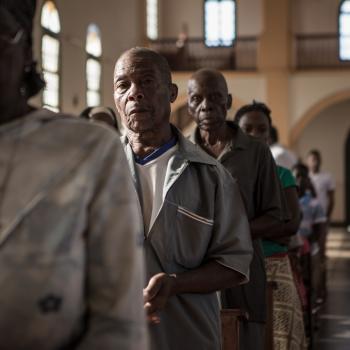 (Continued from yesterday.)
(Continued from yesterday.)
I’m not ready to leap from my son to your son, God.
But am I ready to relax my grip on any other parts of the self that define me?
You have not withheld, have not withheld, withheld . . .
You say Greater Israel, Judea, Samaria, and as you speak, even while you are still speaking, before your last sentence is finished, I’m composing, revising, rehearsing my response to you while my chest tightens, my muscles constrict, my breath speeds up. Am I still listening?
Do I have the strength if not courage, courage if not wisdom to wait, wait for my scripted response (demographics, human rights, competing narratives), playing internally, to run all the way to its emphatic conclusion—marked by an irrefutable exclamation point!—before I respond to you?
And what would I say then, having withheld the predictable counterargument, what would I say after you had finished speaking and stood, awaiting my reply, what might I say if were to allow my reply to arise from silence?
What do the rabbis think about the akedah, the story of the binding of Isaac, a story that withholds so much from us?
How could God ask Abraham to sacrifice his son, the son he loves, his favorite son, to demonstrate his fear of God? How could Abraham not even question God’s intentions in asking for this sacrifice?
How could Isaac go along, like a sheep to the slaughter (remember the Holocaust?), without resisting, not even when it becomes apparent to him (here are the firestone and the wood, but where’s the sheep for the burnt offering?) what Abraham’s intentions are?
How dare you, Torah! How dare you withhold the answers to questions that any reader with a beating heart must ask.
The rabbis say that Satan (in Jewish thought, Satan is God’s adversary) expressed to God his criticism of Abraham for not, at the lavish feast celebrating the occasion of Isaac’s weaning, offering one measly turtledove to God.
To prove to Satan Abraham’s loyalty, God turned to Abraham and said, “I have tried you with many tests, and you have stood up to them all. Now, I beg you, stand to with me in this test, that it not be said, ‘The earlier ones were of no substance.’”
The rabbis say that one day “Abraham prayed to God and said, ‘If you give me a son, I’ll give him to you as a sacrifice.’” Along came Isaac. Some years later, when father and son arrived at Mount Moriah, the place of Isaac’s binding, Isaac asked, “Father, why did you bring me here?” Abraham said, “My son, before you were born I had to make a vow that if I had a son, I would sacrifice him to God.” Isaac said, “Father, I am ready.”
The rabbis say that after he bound his son, Abraham’s “eyes were directed at Isaac’s, and Isaac’s at the heaven of heavens. Tears were flowing from Abraham’s eyes, until his entire body was all but afloat in them.”
Reassuring, perhaps even consoling: This isn’t a test of Abraham but a test of God. This isn’t a story of perfect faith but of a promise kept, a vow honored. This isn’t the story of a heartless father who would readily sacrifice his son for the greater power he serves (immortality, fame) but of a heartbroken man who, against his personal interests, serves a greater good.
This is what the rabbis think, what they think and say. But Torah is silent.
The chancellor of my university has offered to host a reception for the honors program at his magnificent residence. My first thought: I proposed this very idea last year! I want credit for this!
The words crowd my mouth, clamoring to be released, but I keep the gates of my lips shut. As intense as my desire is to prove my value to the honors program, I practice restraint. This is a great accomplishment for the program’s new director as he begins shaping, according to his vision, the program.
Great news, I say! This event will be great for the honors program!
Such withholding: Is this an act of generosity? It doesn’t come naturally to me. It isn’t part of the story of my self.
But is that story, the story of a constant need to prove myself, to win the approval of others, a story that has formed, developed, and hardened over the course of fifty-eight years, a story that I must continue living by?
My life, thank God, has been good so far, rich with blessings. Why take any chances now by even considering the possibility of tweaking the story, or, more daringly, stepping outside of the story to see, perhaps, who and what I am then?
The first of Elul through the tenth of Tishrei comprise forty days of the Jewish year that culminate in Rosh Hashanah and Yom Kippur, a period of deep introspection, self-assessment, and redirection. A process facilitated and enriched, in part, by penitential prayers, and, on each of the two days of Rosh Hashanah and on Yom Kippur, specially chosen readings from Torah.
On the second day of Rosh Hashanah, the akedah, the story of the binding of Isaac is read. It’s my story, a story of resistance, of painful surrendering of what must seem to others insignificant pieces of what I regard as mine, mine, mine. It’s also, a story of withholding, withholding my story to make room for—if not to welcome—stories of others.
Torah wouldn’t have it any other way. That’s why it provokes. That’s why it withholds. Torah draws us out and near so that we may examine ourselves in its brilliant light.










